
The City of Toronto is examining options to redesign the intersection of Eglinton Avenue West and the Allen Road Expressway. This study will explore ways to improve traffic congestion both at the intersection and in surrounding neighbourhoods.
Public feedback, along with technical considerations and City policies and guidelines will be considered in decisions to be made by staff and City Council.
The Eglinton & Allen Intersection Study will focus on the intersection of Eglinton Ave West and Allen Road (the Primary Area), and the redesign will be limited to this area.
The Secondary Area encompasses the local streets that are currently experiencing the greatest congestion and infiltration. The Secondary Area will be included in the analysis of traffic patterns, and will be assessed for opportunities for short-term mitigation measures.
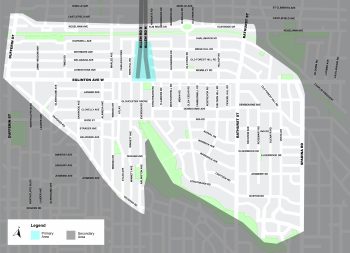
The Allen Road Expressway was first planned as part of the Spadina Expressway to connect the north end of Toronto to downtown. The project was cancelled in 1971 after strong public opposition, so Allen Road now ends at Eglinton Avenue West, a major city street.
Before 2014, the intersection of Eglinton Avenue West and Allen Road had a three-lane northbound on-ramp. From 2014 to early 2023, the intersection had long-term lane closures because of construction for the Eglinton Crosstown LRT (ECLRT). In May 2023, Metrolinx reopened the intersection with a new design. It now has alternating dual eastbound left-turn lanes and dual westbound right-turn lanes, plus pedestrian crosswalks on the north and east sides.
Since reopening, the City has taken back jurisdiction of the intersection and made changes to signal timing and other operations to address traffic congestion. Even with these improvements, traffic problems remain. Congestion on Eglinton Avenue West and nearby streets has slowed travel times, and more drivers are using local streets to attempt to avoid delays.
In 2024, the City looked at short-term options to improve the intersection. The fastest changes have already been made. Medium-scale changes, like moving crosswalks, were assessed as not providing enough benefit to justify implementation.
Because the ECLRT opening has been delayed, pedestrians need to cross the Allen Road ramps to reach Eglinton West Station. The new Cedarvale ECLRT station is expected to open on November 16, 2025 to provide another way to access the station.
In February 2025, City Council asked staff to study long-term redesign options to improve traffic. This includes looking at a pedestrian tunnel or bridge, widening the northbound Allen Road on-ramp, and other physical changes (2025.MM26.12). Council also asked staff to keep working with the community to find short-term ways to reduce congestion while the study continues.
The City has heard from residents about the need for urgent, near term action to address the ongoing impact of traffic congestion caused by vehicles accessing the Eglinton Avenue West and Allen Road intersection from neighbourhood streets.
Following community input through consultations, which included meetings with resident groups, a public meeting and a community workshop in May 2025, and additional discussion with some local residents and interest groups, the City is conducting a trial of traffic pattern changes. These changes are intended to help keep Allen Road-bound traffic on main streets (Spadina Road, Bathurst Street and Eglinton Avenue West), and address traffic congestion on neighbourhood streets around the Eglinton Avenue West and Allen Road intersection.
The trial traffic pattern changes include:
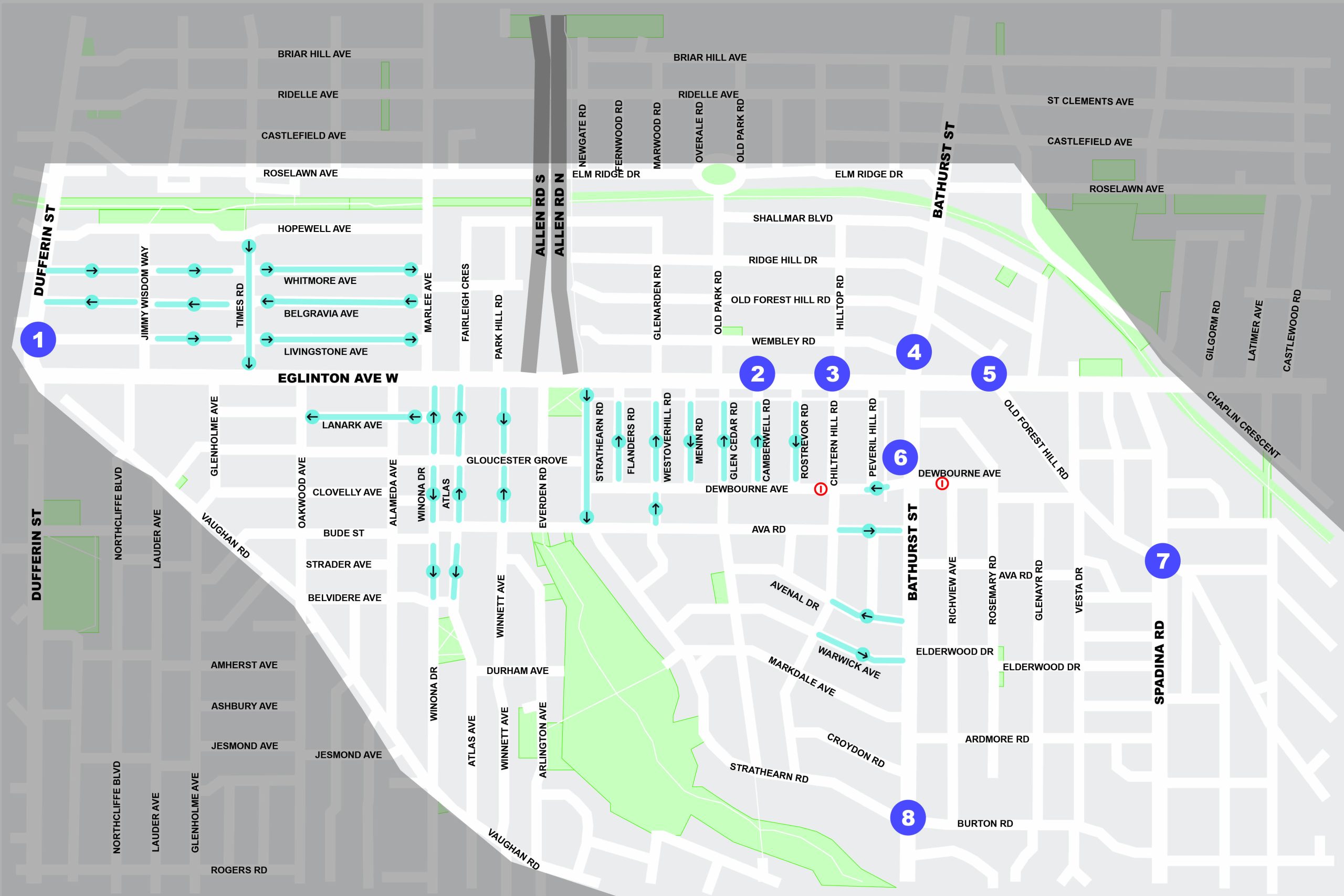
Extend existing southbound left-turn peak hour restrictions to 7 a.m. to 7 p.m. to reduce congestion at Livingstone Avenue and Marlee Avenue.
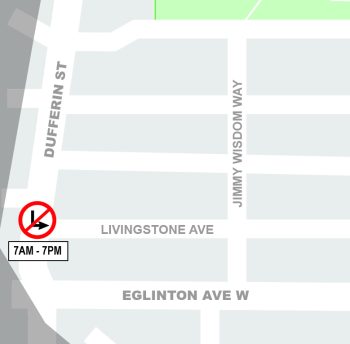
Add northbound left turn restriction 4 to 6 p.m. to reduce peak hour northbound traffic on Camberwell Road.
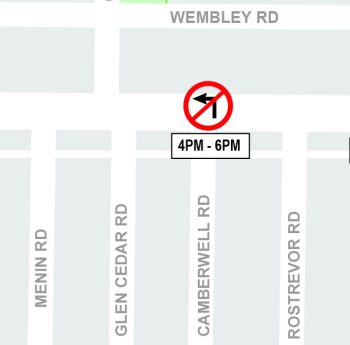
Add northbound left turn restriction 4 to 6 p.m. to reduce peak hour northbound traffic on Chiltern Hill Road.
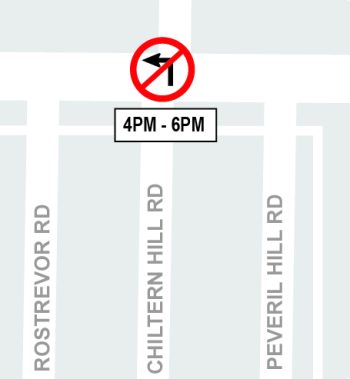
Extend existing peak hour northbound left-turn restriction to 7 a.m. to 7 p.m., and add new southbound right-turn restriction from 7 a.m. to 7 p.m to reduce congestion on Wembley Road, Glenarden Road, and Old Park Road.
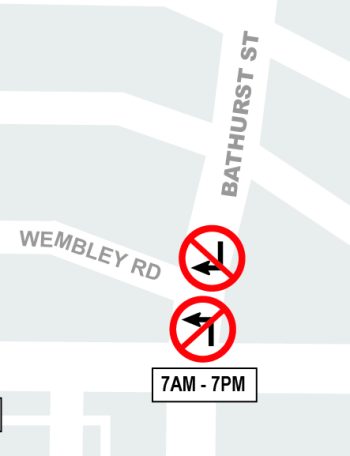
Extend existing peak hour northbound left-turn and northbound through restrictions to 7 a.m. to 7 p.m. and add new westbound right-turn restriction from Eglinton to Old Forest Hill Road from 7 a.m. to 7 p.m. This is to reduce congestion on Old Forest Hill Road, Old Park Road and Glenarden Road.
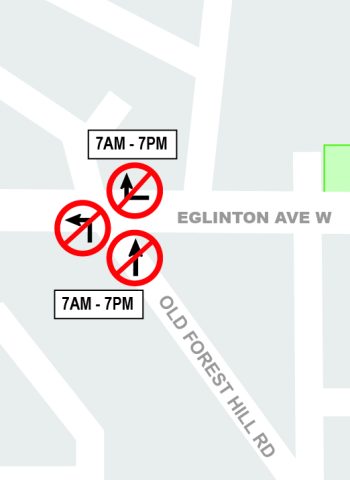
Add westbound ‘Do Not Enter’ restriction on Dewbourne Avenue at Chiltern Hill Road and Richview Avenue to reduce congestion on neighbourhood streets while maintaining access to Holy Blossom Temple and the laneway west of Bathurst Street. Residents of Dewbourne between Rostrevor Road and Chiltern Hill Road and Bathurst Street and Richview Avenue will be able to enter the block eastbound and exit eastbound or westbound.
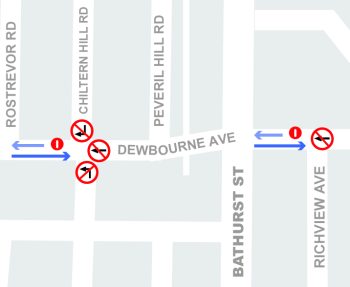
Add northbound left-turn and westbound through restrictions on Old Forest Hill at Spadina Road from 7 a.m. to 7 p.m. to reduce congestion on Old Forest Hill Road from drivers using it as a route to Eglinton Avenue.
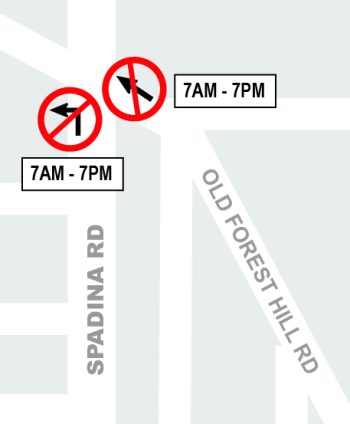
Add northbound left and westbound through restrictions from 7 a.m. to 7 p.m. to reduce congestion on northbound neighbourhood streets approaching Eglinton Avenue.
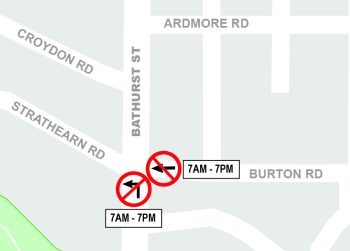
Trial changes are now in effect and include:
Implementing all-day turn restrictions can encourage commuters to stay on major roads, and discourage navigation apps from directing commuters through neighbourhood streets. It is a quickly implementable action that can help alleviate neighbourhood traffic congestion while longer-term redesign efforts for the Eglinton / Allen intersection are underway. Additional opportunities for near and medium-term improvements to neighbourhood congestion challenges will be investigated as part of the intersection study.
A monitoring program to evaluate the effectiveness of the trial ran from mid-January until February 8. Monitoring included traffic counts and collection of public feedback to assess the effectiveness of the changes and to minimize any adverse impacts which will inform potential adjustments or withdrawal of these changes. The City is also coordinating with Toronto Police Service to have increased enforcement.
A community update will be issued when next steps are determined.
Opportunities for residents to engage in this study will be posted in 2026. Sign up for the mailing list to receive notices of consultation events.
A survey to collect resident input on a trial of traffic pattern changes for neighbourhoods around Eglinton Avenue West and Allen Road was open from January 19 to February 8, 2026. Results will be shared in the coming weeks.
A drop-in and in-person workshop was held on May 26, 2025 for neighbours and traffic experts to discuss options to mitigate traffic infiltration on neighbourhood streets around the Eglinton Avenue West/Allen Road intersection.
A Virtual Public Meeting was held on May 13, 2025, that included a presentation and Question & Answer period. View the presentation and recording below.
Consultation Report
Over the last few years, the City has taken steps to address congestion issues at this intersection:
Prior to the beginning of construction on the Eglinton Crosstown LRT (ECLRC) in 2014, the northbound on-ramp to Allen Road operated as a three-lane ramp, with two westbound right-turn lanes and one eastbound left-turn lane. The intersection was redesigned during ELCRT construction and re-opened in 2023 in a two-lane design with alternating dual eastbound left-turn and dual westbound right-turn lanes with a new pedestrian north-south crosswalk. This design was selected to address concerns about eastbound capacity at the on-ramp intersection and to provide safer pedestrian and cycling infrastructure. The analysis of this design assumed that pedestrian demand to cross the Allen Road expressway would be mitigated by the opening of the Eglinton Cedarvale station entrances, but this opening was delayed until late 2025.
A four-lane design for the intersection was considered and studied prior to the re-opening, but was determined to be prohibitive due to complications in grading and would have required property acquisitions on the east side of the ramp. However, the current study will examine potential alternative configurations of a four-lane on-ramp.
The study will include an examination of feasible options to improve the functionality of the intersection. This could include a pedestrian bridge or tunnel, expanding the mouth of the Allen Road expressway on-ramp, and any other physical modifications to the intersection to improve traffic operations. The study will also examine short-term improvements to improve congestion in the neighbourhood while the study is underway.
The majority of the traffic at the Eglinton/Allen intersection is generated by travel to and from Allen Road, which the opening of the ECLRT itself will not eliminate. But it is anticipated that the opening of the new Cedarvale ECLRT station on November 16, which will include entrances on the east and west sides of Allen Road, will minimize pedestrian demand to cross the on and off ramps. Additionally, the opening of the ECLRT will reduce the demand for bus service along Eglinton Avenue, particularly for the 32 Eglinton West bus which currently operates at a frequency of every three to five minutes at peak times. The opening of the ECLRT can also reduce congestion as travel shifts from driving to transit use.
Traffic agents have been deployed to the Eglinton/Allen area as resources and emergency needs permit to support enforcement. As the Eglinton/Allen traffic signals alternate between double eastbound and double westbound turns, pausing only for pedestrian demand, there is little time for agents to over-ride the signals to improve traffic flow. Agents have also been positioning themselves throughout the Eglinton / Allen area as needed, often helping cars exit side streets onto Eglinton Avenue to help ease neighbourhood congestion.
Many residents have requested better enforcement of existing restrictions before introducing new ones. While enforcement does have a temporary benefit, the Toronto Police Service is constrained how often and in how many locations officers can be stationed. The restrictions that have the highest degree of compliance are full day (as opposed to peak hour-only) turn restrictions, as well as the introduction of short segments of one-way streets. Peak hour-only restrictions are not recognized by navigation apps or drivers, therefore have very low compliance.
Residents can report illegal driver behaviour online when they see it occurring or request a TPS enforcement blitz.
The eglintonTOday Complete Streets project continues to include bikeways and public realm upgrades on Eglinton Avenue between Bicknell Avenue (west of Keele Street) and Mount Pleasant Road. Some portions of the project have already been installed, and remaining works will follow when the Eglinton Crosstown LRT opens, as authorized by Toronto City Council. The timeline for installation in areas most impacted by Eglinton Avenue West/Allen Road traffic congestion is still to be determined.
RapidTO is Toronto’s Surface Network Transportation Plan to provide transit priority lanes on major corridors to improve transit service, which includes Bathurst Street between Lake Shore Blvd and Eglinton Ave West. During consultations, residents expressed concern about the impact of any future bus-only lanes on an already congested area. At this time RapidTO: Bathurst dedicated streetcar lanes end at Bathurst Station, and bus lanes do not extend further north.
A new bicycle detector has been installed for people cycling west at the Eglinton/Allen on-ramp intersection. This detector ensures that when there are no people cycling, the bicycle signal will not get activated unless the pedestrian signal has already been activated. Previously, the bicycle signal would turn on for seven seconds every cycle, even if the pedestrian crossing was not activated.
Changes recommended to neighbourhood streets in November 2025 came about because of community feedback about the need for immediate interventions to help address traffic congestion issues on local streets while the longer-term study to redesign the intersection is underway. Consultation was conducted in May 2025. Staff will be carefully monitoring the impacts of these changes, and will be able to add and modify changes as needed. Please sign up for the project mailing list to receive a feedback survey later in the winter, or send comments and questions to EglintonAllen@toronto.ca.
As part of the study, additional opportunities to improve neighbourhood congestion will be explored.
Many residents have requested “Local Traffic Only” signage to solve neighbourhood traffic infiltration. Unfortunately, in Ontario “Local Traffic Only” cannot be regulated or ticketed as it is difficult to identify who is considered “local” (i.e.: residents, visitors or workers or customers to local shops). Also, navigation apps only acknowledge regulatory changes, and would continue to direct people down streets signed as “Local Traffic Only”, making it an ineffective solution.
Subscribe for e-updates to stay up to date on key milestones and opportunities to get involved. Your contact information will be kept private, and will only be used to share information about the Eglinton & Allen Intersection Study.